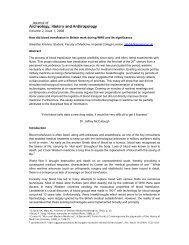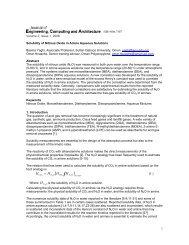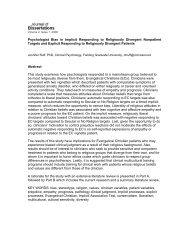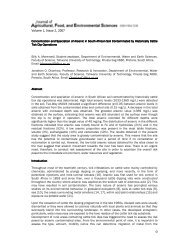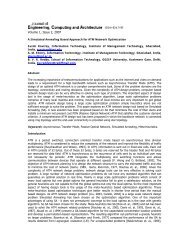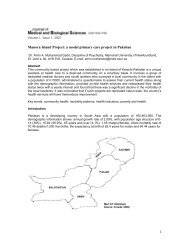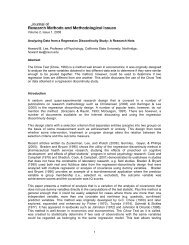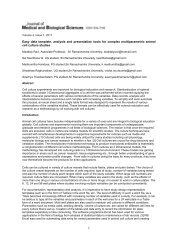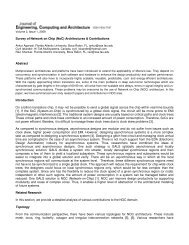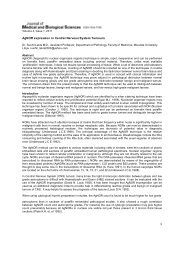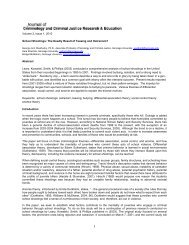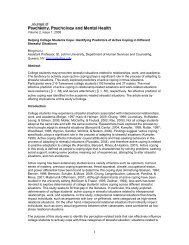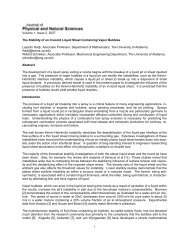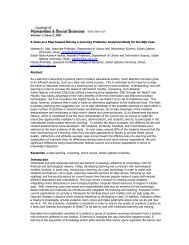The Heaven and Earth Society and the Red Turban Rebellion in ...
The Heaven and Earth Society and the Red Turban Rebellion in ...
The Heaven and Earth Society and the Red Turban Rebellion in ...
Create successful ePaper yourself
Turn your PDF publications into a flip-book with our unique Google optimized e-Paper software.
attack on Guangzhou was reported as around 200,000. 161 But one scholar estimated that <strong>the</strong> actual rebels<br />
numbered around 40,000 <strong>in</strong> 1856. 162 This surpris<strong>in</strong>gly small fight<strong>in</strong>g force, even if we allow <strong>the</strong> number to be<br />
doubled or tripled, could show <strong>the</strong> weakness of <strong>the</strong> rebel army.<br />
It is sure that <strong>the</strong> <strong>Red</strong> <strong>Turban</strong>s at first enjoyed popular support that was, however, stopped when<br />
<strong>the</strong>y failed to enter Guangzhou. Peasants were compelled to become rebels often aga<strong>in</strong>st <strong>the</strong>ir wishes. In<br />
addition, <strong>the</strong> failure to take <strong>the</strong> prov<strong>in</strong>cial capital must have had great psychological effect on <strong>the</strong> <strong>Red</strong><br />
<strong>Turban</strong> leaders as well as on <strong>the</strong>ir potential followers; <strong>the</strong>y had no more prestige <strong>and</strong> no bright future. <strong>The</strong>y<br />
made several abortive attempts to attack Guangzhou. Instead of distribut<strong>in</strong>g food <strong>and</strong> valuables to attract<br />
followers, <strong>the</strong> <strong>Red</strong> <strong>Turban</strong> leaders had to force <strong>the</strong> peasants to jo<strong>in</strong> <strong>the</strong>m by putt<strong>in</strong>g swords on <strong>the</strong>ir necks. 163<br />
Underst<strong>and</strong><strong>in</strong>g <strong>the</strong> fact that <strong>the</strong> <strong>Red</strong> <strong>Turban</strong> followers were mostly compelled by hunger or force, Q<strong>in</strong>g forces<br />
blocked <strong>the</strong> entrance of <strong>the</strong> <strong>Red</strong> <strong>Turban</strong> local tax revenue to large cities <strong>and</strong> hence <strong>Red</strong> <strong>Turban</strong>s now gave<br />
up <strong>the</strong>ir lenient tax system on <strong>the</strong> local population. 164 Ch<strong>in</strong>ese peasants were practical. Whoever could offer<br />
<strong>the</strong>m more food, less tax <strong>and</strong> better protection could w<strong>in</strong> <strong>the</strong>ir hearts. Soon <strong>the</strong> rebels would have to risk<br />
alienat<strong>in</strong>g <strong>the</strong> local populace. Large-scale recruitment to jo<strong>in</strong> <strong>the</strong> Ti<strong>and</strong>ihui seems to have stopped with <strong>the</strong><br />
failure of <strong>the</strong> <strong>Red</strong> <strong>Turban</strong> attacks on Guangzhou <strong>in</strong> 1855. 165<br />
Lack of naval forces was an additional disadvantage for <strong>the</strong> <strong>Red</strong> <strong>Turban</strong> forces when <strong>the</strong>re was<br />
<strong>in</strong>sufficient military power. <strong>The</strong> war aga<strong>in</strong>st <strong>the</strong> Q<strong>in</strong>g forces was largely a struggle for <strong>the</strong> dom<strong>in</strong>ation of <strong>the</strong><br />
Pearl River. Foreign naval power deprived <strong>the</strong> rebels of <strong>the</strong> river communications that had given <strong>the</strong>m food<br />
<strong>and</strong> munitions supplies <strong>and</strong>, above all, mobility. Q<strong>in</strong>g forces bought new weapons from foreigners to<br />
ma<strong>in</strong>ta<strong>in</strong> soldiers <strong>and</strong> to organize a Pearl River navy to patrol <strong>the</strong> river. 166<br />
Foreign Interventions<br />
Officially <strong>the</strong> Western powers, such as Brita<strong>in</strong> <strong>and</strong> France, proclaimed a policy of ‘strict neutrality’<br />
from <strong>the</strong> beg<strong>in</strong>n<strong>in</strong>g of <strong>the</strong> revolt. 167 However, this policy wavered when <strong>the</strong> British residents became anxious<br />
about <strong>the</strong> fate of foreign property <strong>in</strong> Guangzhou. By early 1855, hav<strong>in</strong>g taken Dong’guan, <strong>the</strong> <strong>Red</strong> <strong>Turban</strong><br />
forces had surrounded Guangzhou on four sides, <strong>and</strong> were ready for <strong>the</strong> assault. At this po<strong>in</strong>t, problems<br />
arose between <strong>the</strong> <strong>Red</strong> <strong>Turban</strong>s <strong>and</strong> <strong>the</strong> foreigners whose presence <strong>in</strong> Hong Kong was of major importance.<br />
<strong>The</strong> river communications were immediately <strong>in</strong>terrupted by <strong>the</strong> <strong>in</strong>surgent fleets that extended ten miles along<br />
<strong>the</strong> Pearl River. 168 To prevent a severance of communication between Hong Kong <strong>and</strong> Guangzhou, <strong>the</strong><br />
British <strong>and</strong> American authorities agreed to grant permission for <strong>the</strong> British <strong>and</strong> <strong>the</strong> United States flags to be<br />
flown aboard Ch<strong>in</strong>ese boats. 169 This measure had had two major effects: it secured <strong>the</strong> supply l<strong>in</strong>e of<br />
161 Jian, Quanshi, 830-8.<br />
162 Zheng, “Dacheng’guo,” 19.<br />
163 Guangzhou Fuzhi 82.17 <strong>and</strong> 134.25.<br />
164 Nanhai Xianzhi, 13.40a, 17.13a-15b; F.O. 17/215, Incl. 1 <strong>in</strong> Desp. 112 (July 20, 1854); Wakeman,<br />
“Secret Societies,” p. 42.<br />
165 Rebels’ desperate resort to plunder antagonized <strong>the</strong> general populace particularly after <strong>the</strong>ir failures on<br />
attack<strong>in</strong>g of Guangzhou <strong>in</strong> 1855. See Ibid.<br />
166 F.O. 931.978 Report on cargo of three foreign ships (n.d.); Huang T<strong>in</strong>g’gui 黄 廷 桂 , “Shijiu shiqi<br />
zhongyede Guangdong Ti<strong>and</strong>ihui 十 九 世 纪 中 叶 的 广 东 天 地 会 ,” <strong>in</strong> Xueshu yanjiu 学 术 研 究 No. 1<br />
(Guangdong renm<strong>in</strong> chubanshe, 1963), 29.<br />
167 <strong>The</strong> British policy of neutrality on Ch<strong>in</strong>a as formulated by Bonham was approved by Clarendon,<br />
followed by Bowr<strong>in</strong>g <strong>and</strong> o<strong>the</strong>rs, <strong>and</strong> served as an official l<strong>in</strong>e <strong>in</strong> Ch<strong>in</strong>a for almost a decade. <strong>The</strong> British<br />
home government preferred neutrality; <strong>the</strong> aggressive Palmerstone had left <strong>the</strong> Foreign Office <strong>in</strong> December<br />
1851, <strong>and</strong> his successor, Clarendon, stood for mediation. <strong>The</strong> ris<strong>in</strong>g power of <strong>the</strong> Second Empire under<br />
Napoleon III, <strong>and</strong> <strong>the</strong> deepen<strong>in</strong>g Crimean crisis, also necessitated a policy of non-commitment <strong>in</strong> <strong>the</strong> Far<br />
East. British diplomats <strong>in</strong> Ch<strong>in</strong>a liked such a policy because it gave <strong>the</strong>m ample room for action. Bonham’s<br />
strategy was to sit tight until higher Ch<strong>in</strong>ese officials asked for aid, so that greater dem<strong>and</strong>s could be made<br />
with greater assurance of acceptance. See F.O. 17/200, no. 17, Hong Kong, 10 Mar. 1853; F.O. 17/218,<br />
Desp. 226, Incls., Robertson-Bowr<strong>in</strong>g, (Dec. 2 <strong>and</strong> 5, 1854); Wakeman, Strangers, 146.<br />
168 F.O. 931.1086 A report giv<strong>in</strong>g a brief account of military action <strong>in</strong> north of Guangzhou (Jan. 1855); Jian,<br />
Quanshi, 844.<br />
169 W. C. Cost<strong>in</strong>, Great Brita<strong>in</strong> <strong>and</strong> Ch<strong>in</strong>a, 1833-1860, (Oxford, <strong>The</strong> Clarendon press, 1937), 178; Zheng,<br />
“Dacheng’guo,” 19.<br />
25



